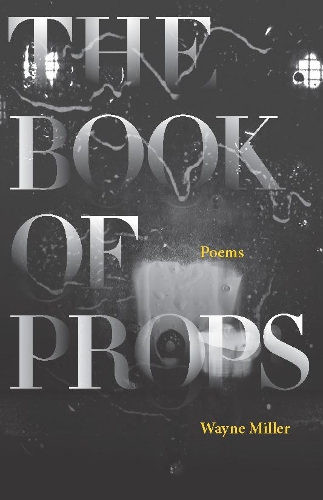
The Book of Props
(Paperback)
Publishing Details
The Book of Props
By (Author) Wayne Miller
Milkweed Editions
Milkweed Editions
9th June 2009
United States
Classifications
General
Non Fiction
811.6
Physical Properties
Paperback
104
Width 139mm, Height 215mm
170g
Description
Elegant, learned, sensual,The Book of Propsoffers mesmerizing images of the scrim of the world, capturing both representation and inspiration.
Mediating claims between the attention objects demand of us and the effects of perception on time, these poems diagram the shifting geometries of human relationships. A tightrope walker who travels on telephone wires; angels, scarecrows, friends, and loversthe speakers inThe Book of Propsoften desire to hold time still, even as they acknowledge that to do so would actually mean the death of love, of experience. These poemsincluding a series presented in an innovative film script formatconstitute an imaginative yet authentic inquiry into the varied constructs in which we define love.
Inventive and engaging,The Book of Propsis a poetic and philosophical endeavor to place oneself in the world.
Reviews
"In his second collection, Miller quietly disassembles everyday life, identifying the rhetoric, folly, expectation, and artifice that make up the world. Light is an important feature--a light on a film set, a car's headlights, the 'flash-veins of lightning'--as it helps the poet notice tiny actions and the monumental changes they inspire. An artist, for example, bites into her still-life's apple, choosing to 'destroy the room's echo / of the canvas' and calling into question the accuracy of the space. Like his characters, Miller makes a vast impact using the smallest stroke--he is careful and suspenseful, wary of flamboyance. In a series of poems that emulate a screenplay, props like 'disembodied / buttons, a collapsed preschool- / quality mobile, empty test tubes' pile up without obvious meaning. Readers in search of ready-made epiphanies are not welcome here. --The New Yorker "Transformations--from the everyday to the wondrous and/ or haunting--are everywhere in Miller's elegant second book. The poems are at once dreamlike and fervent in their will to cleave to the material world. "Sleep gives the body back its mouth," writes Miller in one poem. Elsewhere, the shouts of a beaten man become "flashbulbs/ striking the river," and a lightning storm becomes a meditation on loss and clarity. In the title poem, everyday objects--a hammer, glasses, a cup, a matchbook--take on mythic significance, as if they had souls of their own, and a lover's kiss becomes "another object pressed/ between them." Miller (Only the Senses Sleep) mixes what is with what we perceive and what could be without explanation or commentary. A series of poems labeled "notes for a film in verse" continue Miller's exploration of the intersection of observation and artifice, this time through whimsical characters--a tightrope walker hiking telephone wires across the country, a pair of distant, angels talking to scarecrows, a girl fascinated by cement trucks, a drawbridge operator in a bar. Miller remains a poet to watch, and one who strives to "separate/ the seeing from what's seen." --Publishers Weekly (starred review) "Wayne Miller's poetry is entranced, luminous, supernaturally poised. He drifts through a world that is twilit, looming, strangely stilled, and somehow in need of his care, as if he had stayed up till some record late hour to watch over dreamers and scenes disarmed by sleep, a sad, fond ghost coaxing them to "surface into themselves." He is the purest kind of lyric poet, neither narrating nor explaining but saying over and over their beauty and poignance and power." -- James Richardson, author of Vectors and Interglacial "These poems are not about the world. Rather, they are the world put into words. The outside world is visible in and through these poems, which are thrilling in their metaphysical questioning and deeply satisfying in their perceptions. I can't resist lying down in the snowprint these poems make. Miller's language is irresistably sensual. Lush, lavish and achingly accurate, Miller's words have an almost corporeal realness to them--a kiss that becomes an object pressed between lovers, a 'room that will be the ghost of right now/ for as long as we carry it.'" I was transfixed by this book. -- Rachel Zucker, author of Eating in the Underworld "Best New Book of Poetry, Best Short Poem in a Collection, Best Final Poem in a Collection, and Best Opening Lines in a Collection" -- Coldfront (2009 Year in Review)
